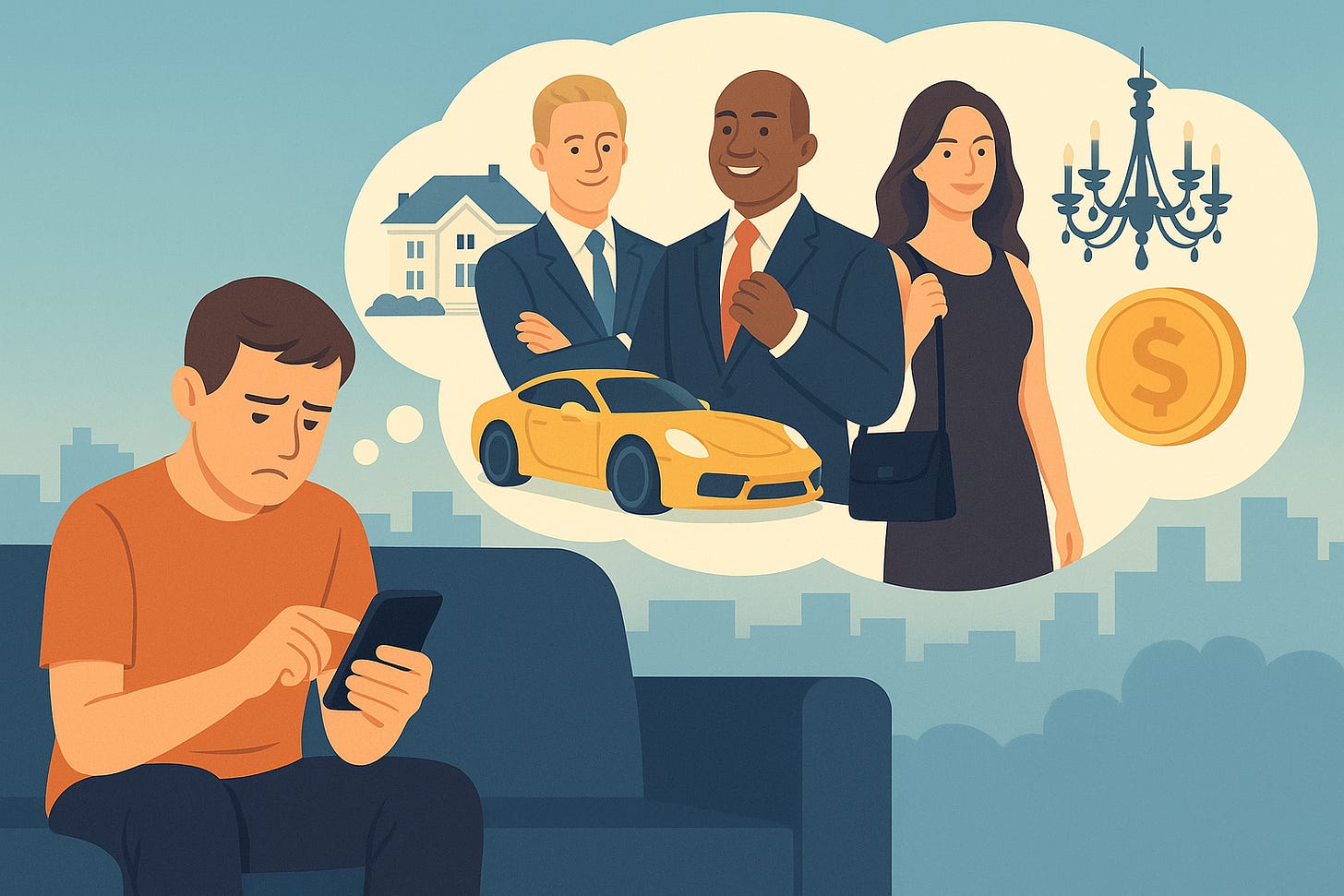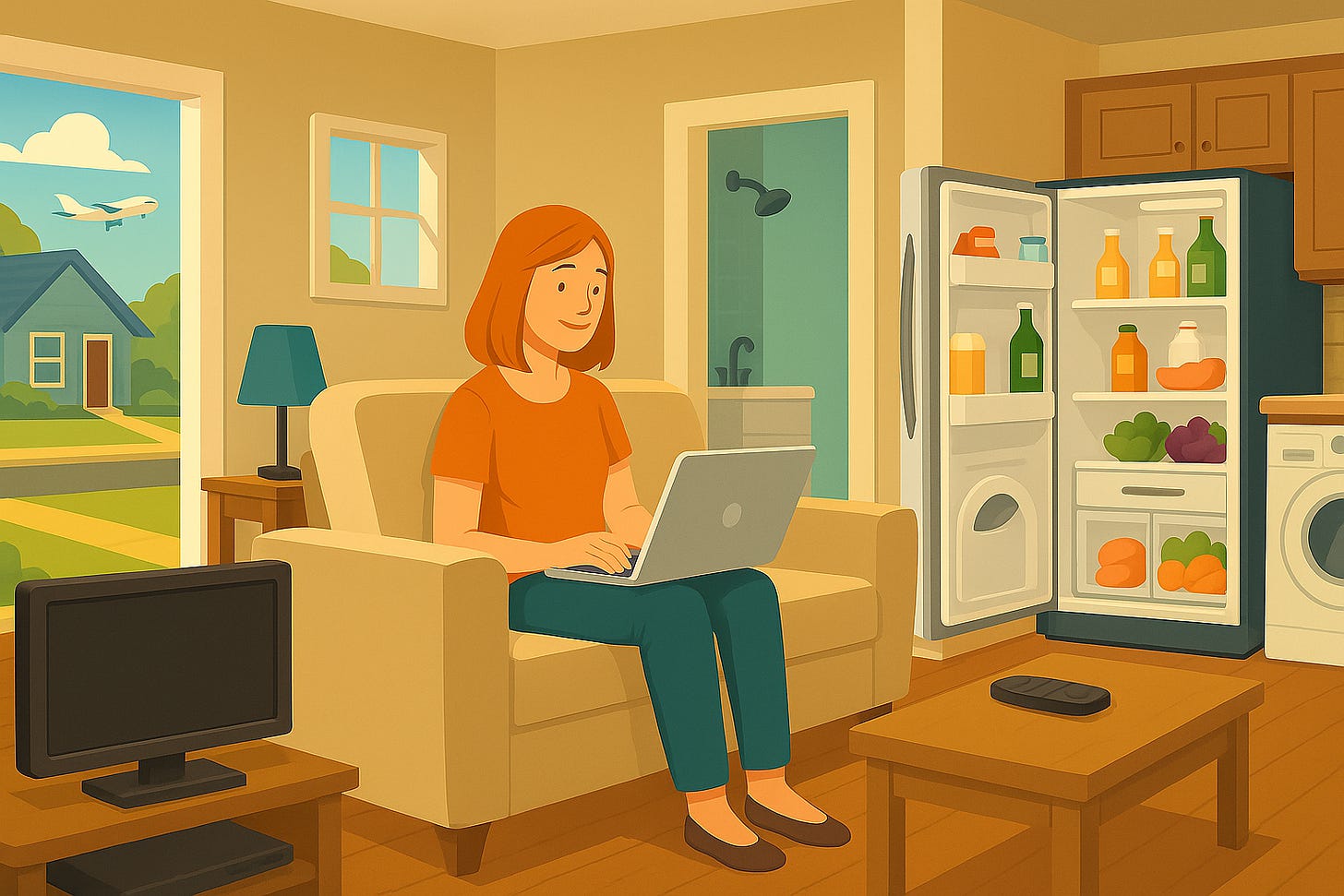How to get rich quick
Contrary to expert advice, there *is* a way
Financial experts will tell you there is no such thing as “getting rich quickly.” That the only way to get rich is slowly, via long-term investments or career advancement.
I generally agree—and have written about both of those crucial methods—and yet, the experts are still wrong. There is a way to get rich quick, and remarkably few people do it.
How? Change your definition of “rich”.
Instead of saying “rich means having as much money as [my richest friend/the richest influencer I follow/Elon Musk]”, say “rich means having enough money to meet my biggest needs.”
As long as you are comparing your money to others’, you’ll never be satisfied. In previous generations, the expression “keeping up with the Joneses” implied trying to attain the level of wealth of the richest family in your neighborhood. But nowadays, your field of vision is not only limited to your neighborhood: through the internet, and especially social media, you are exposed every day to people who are not only richer than you, but the very richest people on the planet.
Approximately 0.0004% of the world population has more than $100 million. Imagine you could talk to one of these people. The conversation may go something like this:
You: “You’re rich.”
Centimillionaire: “Sort of. I have many friends with a lot more money than me. My billionaire friends have 10 times as much money as I do.”
You: “So? What can they afford that you cannot?”
Centimillionaire: “A lot! I can only rent a private jet when I travel; they can buy one. I can only afford to keep up three mansions; they can have thirty. I can ensure my children and grandchildren will be fully taken care of; they can ensure it for their great-grandchildren.”
This sounds a bit absurd, right? But, if you make $60,000/year (the median U.S. income), you could be saying the same kinds of envious things about people who make $600,000/year (10 times as much). To almost any human being elsewhere in the world/in history, that conversation would sound equally absurd.
With a salary of $60,000/year, you can likely afford:
Housing – You can pay up to $1,500/month in rent, which is enough to live in almost any city or suburb you want and still be commuting distance from many jobs, a grocery store, etc.
Food – You can go to said grocery store any day, any time, and buy anything you want to eat.
Electricity – For $100-150/month, you can get enough electricity to power: a refrigerator and freezer (no need to get a daily delivery from the iceman, or salt your meat); lights (no need to light dangerous, flickering candles); a washing machine and dryer (no need to spend hours hand-laundering clothes).
Water – For $40-60/month, you can drink as much water as you want, take a hot shower or bath as many times as you want (a luxury previously reserved for literal kings!), all on-demand (no need to carry heavy buckets of water from a well); and all of that water is clean (virtually no risk of parasites or infection).
Climate control – Your home is warm in the winter and cool in the summer. You are literally immune to the elements, and basically never feel the discomfort of being too hot or too cold while indoors.
Healthcare - For $4,000-6,000, you can get health insurance, which gives you access to virtually every service/procedure/drug modern medicine can offer (all of which contribute to extending your lifespan, to the current average of 78 years).
WiFi and data plan – For $100-200/month, you can learn about anything that’s ever been written, and find it within seconds; you can talk to anyone you want to in the world, in real-time.
Entertainment – For $10-40/month, you can watch any movie or TV show you want (many of which took tens of millions of dollars to produce), and listen to any piece of music that has ever been created.
Vacation – About once per year, you can go anywhere in the world you want to go, and get there in less than one day’s time (just think of how insane that would have sounded two hundred years ago).
If you are going to compare, then compare yourself to all humans, not just the tiny sliver of them you see in movies and on social media. And of course, that includes all humans in time; only 7% of humans who ever lived are alive today – you could have easily been one of the others.
If you can afford half the things on that list, you are probably in the richest 0.1% of people who ever lived. And if you can afford all of them, you are probably in the top 0.01%. (What did you do to deserve to get so lucky, to be born here and now? I have no idea.)
Do you not totally believe this yet? If you still think “rich people” are the ones who can buy a big house, or take multiple vacations a year, or afford Taylor Swift tickets… I did say this was about getting rich “quickly”, not “instantly.” 😁 Give it 3 days to work:
Each day, have one conversation with someone about this contention: “rich means having enough money to meet my biggest needs.” At night, spend five minutes reflecting on the list above before falling asleep. On the morning of the 4th day, you will wake up to find that you are rich.
In other news…
“These tips and advice will change how you view yourself and the world in this super inspiring conversation. Raffi also shares the most comforting perspective I’ve heard if you’re feeling like the world today is getting more chaotic and scary.”
⬆️ That’s what Liz Moody wrote about the podcast we recorded together. I think there’s a reason Liz’s podcast is so successful: she is an excellent interviewer, and was able to draw out ideas and opinions that I was holding beneath the surface. More than once I thought to myself, “should I really be sharing that?” But I did... so enjoy!
Spotify:
Apple Podcasts:




Unfortunately in much of California, it does take more than $60,000 to do all of the above. I think a couple of years ago the number for a family of 4 to do all these things was $149,000 a year. That seems about right in SoCal, but probably not enough in San Francisco/Silicon Valley area. Still, the principle of changing one’s perspective on what makes us “rich” is a good one!
Anthropologists like David Graeber and Michael Sahlins argue --and I'm being reductive-- that with increasing means comes increasing desires, so that Stone Age people were no less satisfied with life than we are, and in fact may have been more so. This seems like a great puzzle: how to increase standard of living without disproportionately increasing our *expectation* for standard of living.
Perhaps this is a gauche self-plug, but I wrote about this idea last year! https://www.quiantenos.com/p/working-hard-or-hardly-working